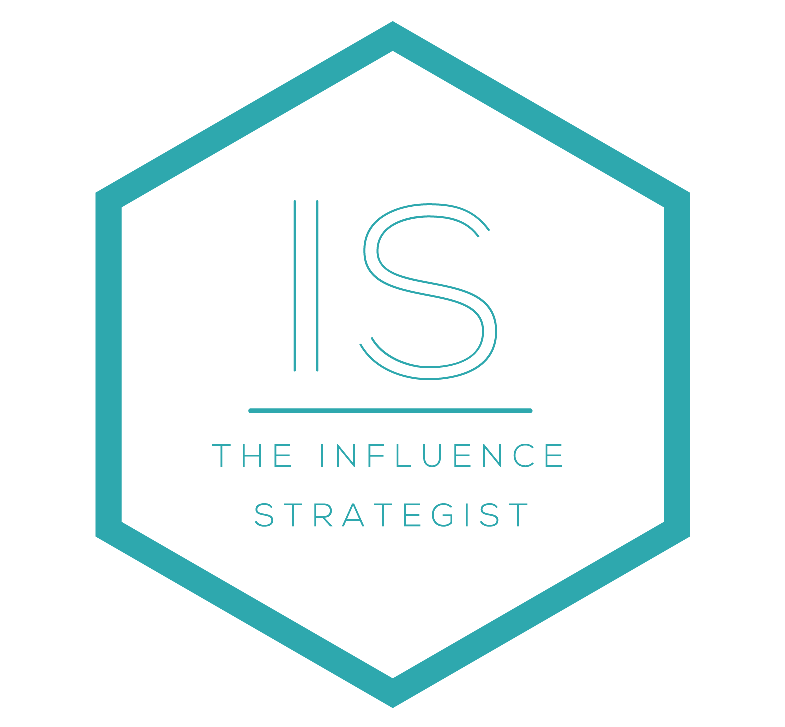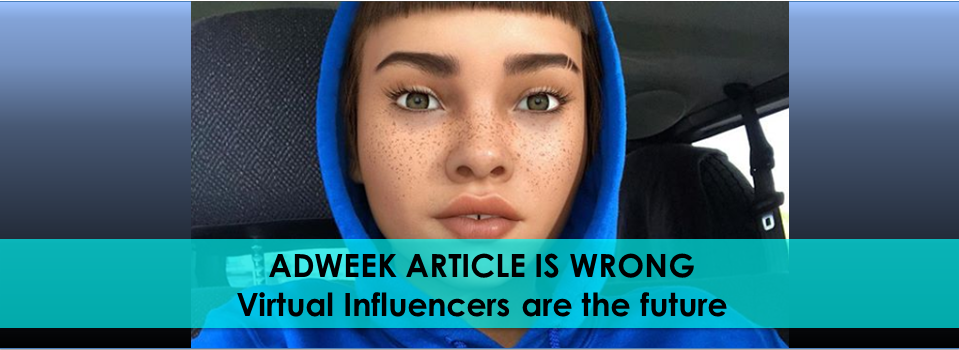ADWEEK opinion piece is wrong, Virtual Influencers are the future
Image courtesy of of @lilmiquela instagram
There was an opinion piece in Adweek on May 15 about Virtual Influencers (if you haven't seen a "virtual influencer" then check out "lilmiquela" on Instagram . The article is a strong criticism of Virtual Influencers, it states that;
"..artificially creating personalities poses a massive potential risk to the future of culture and media", and .."they are not good for influencer marketing, social media and culture as a whole".
It is written by Richard Wong who is a highly experienced Influencer marketing professional and works for an impressive Influencer marketing company that I admire www.hashtagpaid.com - the company focuses on creating partnerships between Influencers and brands whose values truly match each other, a subject close to my heart as I developed a processes to help do exactly that, The Influencer Match tool . However, in this situation I think his opinion on Virtual Influencers is completely wrong.
My opinion is that not only should Brands engage and create AI powered Virtual influencers, but that they will grow in importance and relevance and become a dominant marketing channel, far from running from them, we should be embracing them and working to create an infrastructure and legislation around them that is ethical and positive for our culture.
Richard has three specific critiques which I outline and counterpoint below, but they can all be summed up in 2 words "human nature". Tech, as always, is an amplifier of human nature. It can be used for good or bad, it's not the tech that’s bad but the people behind them, and that’s what Richard has missed in his critique of what I believe will be one of the biggest movements in marketing in the next decade.
Critique 1) Unrealistic expectations: Richard argues that "Computer-generated graphics are intended to be flawless and not have any imperfections, … they create unrealistic expectations about what beauty, style and culture looks like. This can lead to serious implications for young people—in their formative years of their life—who look to social media stars as key influences, …and virtual influencers will further perpetuate these issues".
"Unrealistic expectations" is not a tech problem it’s a human problem, amplified by media and tech. We've been airbrushing and photoshopping images of ourselves forever, it's just that now we all have the tools do so on our phones. Filtered images are ubiquitous, in this environment knowing that someone is not real is EXACTLY what we need to help us understand that SM in and of itself is often an enhanced environment.
Real people are damaging our children right now - no need for a virtual influencer - I would rather have an avatar we know is fake than a digitally remastered human pretending to be real?
I also hope one day we have AI's that can tag every image that been enhanced, that's the kind of thing we need to help this issue. and reduce the unrealistic expectations.
Critique 2) Motivations: The article says, "When we look at these virtual influencers, we have to also consider who the parties are behind these personalities. ..The fundamental issue with a company running an internet personality is that it has one primary incentive: profits".
So the argument here is that we need to be wary of the motives of the people behind the Virtual influencers, valid, but it's not a reason to not use Virtual influencers. It misses the point, this is a human, not tech issue, for example, how good is this ladies motivation below?
Kim Kardashian advertising an appetite suppression lollipop - what a lovely thing to do when we have so many serious body image issues, I wonder what her motivation was?
This is a Kim Kardashian telling young girls to suppress their appetite so she can earn cash from an appetite suppressant lollipop company. The point is that if someone's motivations are unethical then they are unethical, this is unrelated to Virtual Influencers and if we should or shouldn't use them. My feeling is that Virtual Influencers should be Blockchained so we know the parties owning and controlling, anything that happens that is unethical then there is a direct line of responsibility.
Critique 3) Authenticity: Richards final critique is as follows. "When a blogger or influencer endorses a brand on their social media account or blog, they review and try the products out and provide their honest opinions before they share this with their audience. Virtual influencers aren’t able to try on clothing brands, aren’t able to see what food products they like, aren’t able to know what beauty products work best on them—the best they can do is mimic what current trends are and provide inauthentic product endorsements. Virtual influencers offer no authenticity behind the endorsements they provide".
I have highlighted three points here. Honesty: Lots of the opinions of Influencers are not honest... some are, some are not at all. Don't get me wrong, I have fought for years to focus on "Authentic Influencers ", but Virtual Influencers wont exacerbate this problem. They are controlled by humans anyway so they won't just "mimic trends" - which is what lot of nascent real world Influencers do to establish their credentials anyway., so this is hardly a reason not to use VI's.
And then there is the question of in-authenticity. Some Influencers appeal because they are authentic, but not all and that is not what Influencers marketing is all about - oh how I wish it was. Let's check out Kim K above, almost her entire life is manufactured. She makes her money by creating a "scripted reality" TV show, all her images are photoshopped, her entire life is false.
And at this level the truth is her audience doesn't care, they want to live her lifestyle. Kim is what I call a "Power Influencer", people aspire to live their lifestyle, they don't believe what they says? Ask any 16 yr. old if they think Kim K is authentic and they will laugh at you, they know it's not true, they also know she has a tonne of amazing opportunities and swag and they want it, but its lifestyle, not authenticity. Brands that use these tend to be ones that are seeking "aspiration" from their campaigns - clothes, make-up etc.
There are other kinds of Influencer's who are authentic - check out how I breakdown Influencers in my Influencer marketing Manifesto on this site. I split Influencers by the goals they can achieve for brands and the different ways they are perceived by followers - "Trust" (authenticity) registers highly for "Local Heroes" and "somewhat with "Niche Influencers" - but not all inf marketing is about authenticity.
The key is the authentic BOND created between inf and follower, and that is something Virtual Influencers can do as well as anyone alive, this however is a subject for another post.
IN CONCLUSION: Virtual Influencers are the future, there is nothing they can or can't do - good or bad - that isn't already being done already by real world Influencers The key is correct regulation and accountability. fully expect my daughter who is now 4 to be engaging with Virtual Influencers, powered by AI, in an environment that's regulated and will be of general massive benefit to society. There will be bumps along the road but it's not something to be frightened of, its something to embrace, help shape and can be of massive benefit to our society and I plan on advising all my clients to become fully engaged in.
ADWEEK : www.adweek.com/digital/virtual-influencers-lead-to-virtual-inauthenticity/amp/
Richard Wongs (very impressive) Influencer agency www.hashtagpaid.com


